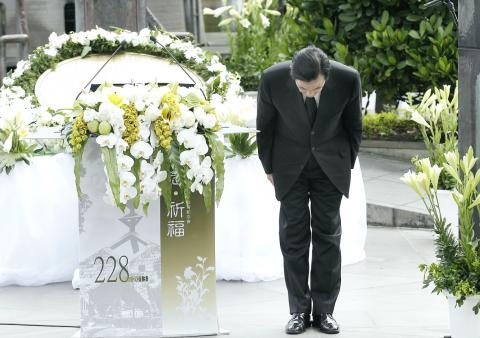President Ma Ying-jeou (馬英九) yesterday bowed to apologize for the then-Chinese Nationalist Party (KMT) government’s crackdown on civilians during the 228 Massacre, and instructed the Ministry of Education to increase the amount of educational materials dealing with the incident to teach the next generation about the tragedy.
Speaking at the main memorial ceremony, which was held in Yilan City, the president said he understood that the suffering and pain of the victims of the incident and their family members could not be erased, despite years of efforts by the government to acknowledge past mistakes, offer a formal apology to the victims and their families and make the day a national holiday, and promised to protect human rights and promote peace to prevent such incidents in the future.
“I know that memorial ceremonies cannot take away the sufferings of the victims and their families. On behalf of the nation and the government, I apologize again to the victims and their families,” he said.

Photo: Pichi Chuang, Reuters
Ma renewed his pledge to uncover the truth behind the tragedy, and promised to promote human rights as a universal value that has been underscored by the historical tragedy.
Lu Song-hai (呂崧海), the director of the Family of Victims of the 228 Incident Association in Yilan, said the Ministry of National Defense and all the intelligence bodies should open all related documents to help uncover the truth behind the tragedy.
He also urged the government to increase the amount of educational materials dealing with the incident to turn the tragedy into a significant lesson in history for the nation.
Ma said he would instruct the Ministry of Education to focus on the 228 Incident and help the nation learn from the incident and the White Terror era.
Yesterday marked the 66th anniversary of the 228 Incident, which refers to a brutal crackdown launched by the then-KMT regime on Feb. 27, 1947, against tens of thousands of Taiwanese, many of them among the intellectual elite. The incident led to nearly four decades of martial law in Taiwan.
During the ceremony, Peter Wang (王獻極), convener of the 908 Taiwan Republic Campaign, and a small group of protesters called for Ma to step down. Security guards immediately carried Wang out and cleared the scene.
Ma yesterday presented to the family of 228 victim Chiang Shih-chin (蔣時欽) a certificate restoring the reputation of the native of Yilan and son of Chiang Wei-shui (蔣渭水), an important figure in Taiwan’s resistance against Japanese colonial rule.

NATIONAL SECURITY THREAT: An official said that Guan Guan’s comments had gone beyond the threshold of free speech, as she advocated for the destruction of the ROC China-born media influencer Guan Guan’s (關關) residency permit has been revoked for repeatedly posting pro-China content that threatens national security, the National Immigration Agency said yesterday. Guan Guan has said many controversial things in her videos posted to Douyin (抖音), including “the red flag will soon be painted all over Taiwan” and “Taiwan is an inseparable part of China,” while expressing hope for expedited “reunification.” The agency received multiple reports alleging that Guan Guan had advocated for armed reunification last year. After investigating, the agency last month issued a notice requiring her to appear and account for her actions. Guan Guan appeared as required,

A strong cold air mass is expected to arrive tonight, bringing a change in weather and a drop in temperature, the Central Weather Administration (CWA) said. The coldest time would be early on Thursday morning, with temperatures in some areas dipping as low as 8°C, it said. Daytime highs yesterday were 22°C to 24°C in northern and eastern Taiwan, and about 25°C to 28°C in the central and southern regions, it said. However, nighttime lows would dip to about 15°C to 16°C in central and northern Taiwan as well as the northeast, and 17°C to 19°C elsewhere, it said. Tropical Storm Nokaen, currently

PAPERS, PLEASE: The gang exploited the high value of the passports, selling them at inflated prices to Chinese buyers, who would treat them as ‘invisibility cloaks’ The Yilan District Court has handed four members of a syndicate prison terms ranging from one year and two months to two years and two months for their involvement in a scheme to purchase Taiwanese passports and resell them abroad at a massive markup. A Chinese human smuggling syndicate purchased Taiwanese passports through local criminal networks, exploiting the passports’ visa-free travel privileges to turn a profit of more than 20 times the original price, the court said. Such criminal organizations enable people to impersonate Taiwanese when entering and exiting Taiwan and other countries, undermining social order and the credibility of the nation’s

‘NATO-PLUS’: ‘Our strategic partners in the Indo-Pacific are facing increasing aggression by the Chinese Communist Party,’ US Representative Rob Wittman said The US House of Representatives on Monday released its version of the Consolidated Appropriations Act, which includes US$1.15 billion to support security cooperation with Taiwan. The omnibus act, covering US$1.2 trillion of spending, allocates US$1 billion for the Taiwan Security Cooperation Initiative, as well as US$150 million for the replacement of defense articles and reimbursement of defense services provided to Taiwan. The fund allocations were based on the US National Defense Authorization Act for fiscal 2026 that was passed by the US Congress last month and authorized up to US$1 billion to the US Defense Security Cooperation Agency in support of the